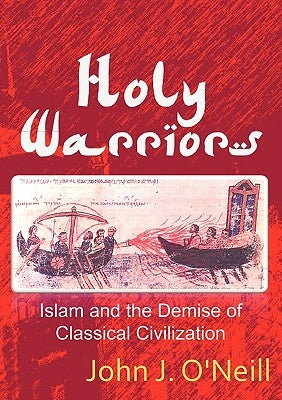Before you leave...
Take 20% off your first order
20% off
Enter the code below at checkout to get 20% off your first order
Discover summer reading lists for all ages & interests!
Find Your Next Read

One of the most enduring problems of history is the decline of Classical Civilization. How was it that the civilization of Greece and Rome, which had endured almost a thousand years, a civilization which prized learning, science and reason, gave way to the world of the Medieval; an age which saw, for a while, the almost complete disappearance of the rationalist spirit of Greece and Rome? The traditional view was that after their seizure of Italy in the fifth century, the Barbarian tribes of Germany and Scythia had reduced Europe to an economic and cultural wasteland, initiating a Dark Age, which was to last half a millennium. After the Reformation, another suspect was added to the list: Christianity, or, more accurately, Catholic Christianity. In this view Christianity was corrupted beyond recognition after the time of Constantine and from the fourth century onwards a power-hungry Church hierarchy, in cahoots with the Imperial authorities, kept the population of Europe in subservience and ignorance, effectively completing the destructive work of the Barbarians.
In this ground-breaking work, historian John J. O'Neill examines a great variety of evidence from many specialties and reaches an astonishing and novel conclusion: Classical Civilization was not destroyed by Barbarians or by Christians. It survived intact into the early seventh century. The Vandals and Goths who seized the Western Empire in the fifth century had become completely romanized by the start of the sixth century. Artistic and intellectual life flourished, as did the economy and the cities built earlier under the Empire. Yet sometime in the middle of the seventh century everything changed. Cities were abandoned, literacy plummeted, royal authority declined and local strongmen, or "barons", seized control of the provinces. The Middle Ages had begun.
Who or what had caused this? As O'Neill notes, by the 1920s Belgian historian Henri Pirenne had located the proverbial "smoking gun"; but it was not in the hands of the Barbarians or the Christians: it was held by those who, even then, it had become fashionable to credit with saving, rather than destroying, Classical Civilization: the Arabs. In a conclusion that will have resonance for the modern world, O'Neill argues convincingly that all we regard as "Medieval" had its origin in Islam, and that the Muslims terminated Classical Civilization in Europe just as surely as they did in the Middle East. O'Neill shows how the sudden relapse of Europe in the seventh century was due entirely to the economic blockade imposed by Islam's war against Christendom. The Mediterranean, which had previously been a cultural highway, now became a frontier, and a very dangerous frontier at it. Prompted by Islam's doctrine of perpetual war against nonbelievers, Muslim pirates scoured the Mediterranean, effectively ending all trade between Europe and the great centers of civilization in the Near East. The flow of gold ended, as did the supply of all luxury items. And so too did the supply of papyrus from Egypt, without which Europeans were forced to rely on expensive parchment. Not surprisingly, literacy plummeted. Worst of all, the great cities of the West, which depended upon the trade in luxury items from the East, began to decline.
As the dominant power of the time, ideas originating in the Islamic world now began to penetrate Europe. From their Muslim foes Christian Europeans began to think in terms that would have been unimaginable a century earlier. The idea of "Holy War" entered the mindset of Christians, and, under the influence of Islam, the rationalism of Greece and Rome began to be replaced by a literal and intolerant interpretation of "The Book." Classical civilization was dead.
Thanks for subscribing!
This email has been registered!
Take 20% off your first order
Enter the code below at checkout to get 20% off your first order